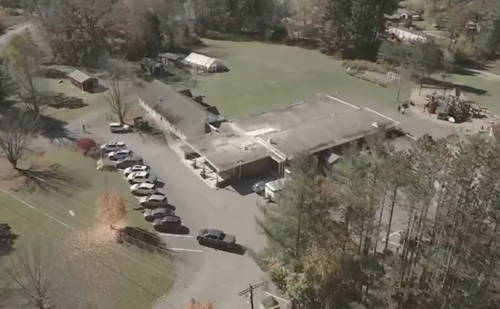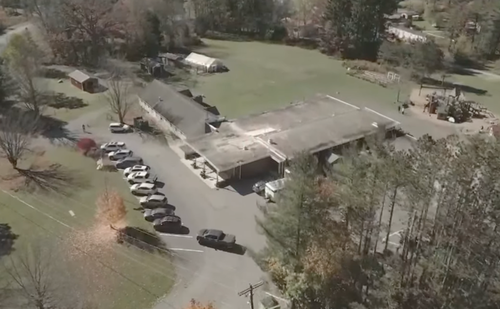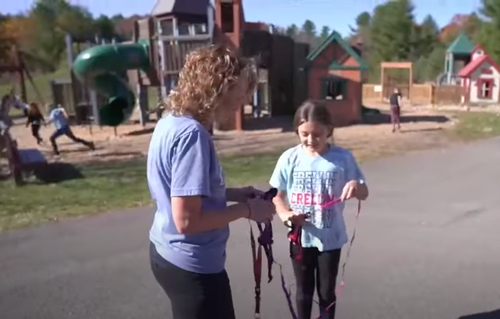Mountain Miracle: One Of Maryland’s Poorest Elementary Schools Outperforms Thanks To “Our Community”
A remarkable education success story in Western Maryland plays out in the heart of Trump’s coal country—where “Trump Digs Coal” signs lined the roads during this past election cycle. It’s a heartwarming story of how community, family, traditionalism, and conservative values come together and foster the proper learning environment that allows children at one of Maryland’s poorest elementary schools to achieve massive education outperformance compared with hundreds of other schools in the state.
Investigative journalist Chris Papst of Fox45 News’ Project Baltimore visited Crellin Elementary School, Maryland’s westernmost school, just about a mile from West Virginia. It’s a Title 1 school, meaning it has a massive concentration of impoverished students. Of the more than 1,400 public schools in the entire state, 464 are considered Title 1.
A public school w/ bee hives, an amphitheater built from coal, hemlock forest, apple orchard, greenhouse, vegetable garden, goats, sheep, chickens, wetlands & a trout stream.
It’s Maryland’s only high-poverty 5-Star school.@FOXBaltimore @GCPSHappeningshttps://t.co/Fat6gYWOlM
— Chris Papst (@chrispapst) November 7, 2024
Of those 464 schools, Crellin is the only one earning a five-star educational excellence rating from the Maryland State Department of Education.
Even though the children come from some of the poorest households in the state and possibly the nation, the educational miracle at Crellin is very simple: community.
“We took the walls down to the school and open it up to the community. So, the community is part of our school,” Principal Dana McCauley told Papst.
Papst’s report continues:
Principal Dana McCauley knows her school, Crellin Elementary, in Garrett County is unique. She knows Crellin is Maryland’s westernmost school, just about a mile from West Virginia. She also knows it’s likely the only one in the state where elementary students walk chickens at recess.
“The kids have a stake in the school?” Asked Project Baltimore’s Chris Papst.
“Oh yes. Yeah. So, they’re responsible for there’s many chores that need done around here. Many chores,” explained McCauley.
“The kids do chores?” Replied Papst.
“They do chores. Yes,” replied McCauley. “There’s all the barn work that needs done. The stalls have to be cleaned, the animals need fed and watered every day. The eggs need collected.”
So, how does this translate to educational success? McCauley says the students feel like the school is “their place” and “they’re invested in it”.
…
So, how did that happen? The story begins 23 years ago.
McCauley has been leading Crellin Elementary since 2001. Not just as its principal, but also as a teacher. And it was in that role that, 23 years ago, she made a life-changing discovery.
“I remember my first year here sitting in class watching some of the kids. And then going outside with them, going down to the stream and watching some of our squirrel-iest kids in the classroom thrive. I thought, there’s got to be something to this,” McCauley told Project Baltimore.
Soon after, McCauley learned Crellin sits on the polluted land of an abandoned coal mine where acid mine draining has colored the rocks orange. At first, to McCulley, that seemed like a big problem. But it was within the rocks that she had an idea.
“It’s good to not know what you don’t know. That makes sense? So, you’re not afraid of the obstacles because you’re not even aware of what they might be,” explained McCauley.
On a whim, McCauley gathered community support and petitioned Garrett County, which awarded the school ownership of a six-acre site of the mine to clean up. That was the moment Crellin’s unique story began.
“We took the walls down to the school and open it up to the community. So, the community is part of our school,” said McCauley.
Over the next few years, the students, staff, parents and neighbors worked to restore the land. Now, there’s thriving wetlands, a hemlock forest and trout stream, which is all made possible by a limestone retention pond the school built to naturally filter and clean the acid mine drainage.
Once the school had fully cleaned the six-acres, McCauley expanded her vision. Maryland does not have sanctioned agricultural programs for elementary schools. So, in 2013, McCauley started her own. Today, Crellin has an apple orchard, greenhouse, vegetable garden and multiple barns with goats, sheep and – of course – chickens.
Parents, according to McCauley, built the hen house. And now it is maintained by the school community, which includes the students.
You see, where the students work is also where they learn. A classroom amphitheater is built from a giant pile of coal covered in dirt. Class is held in the greenhouse all winter long.
Crellin Elementary is a public school. But McCauley says no public education dollars were used for any of the school’s agricultural or coal mine reclamation projects. Over 23 years, McCauley has applied for dozens of local, state and federal agricultural and reclamation grants. She won most of them, collecting hundreds of thousands of dollars for the school and its many projects.
“It’s a lot of work,” McCauley told Project Baltimore.
Work that over two decades has culminated in Crellin’s five-star rating which makes this school one of one in Maryland.
“Is what you’re doing here. Could it be done at any school?” Questioned Papst.
“I think it’d be different. Because this is unique to our community,” explained McCauley. “Because it’s not about the stream. It’s not about the stream. It’s about those who help make that all possible. That’s what it’s all about.”
The education miracle in the mountains of Maryland, at one of the state’s poorest elementary schools, shows that massive budgets aren’t necessary to improve test scores. Instead, community, family, tradition, hard work, and conservative values create an environment that money can’t always buy, uplifting these children spiritually and setting them up for success.
Must Watch:
On the opposite side of the state, in the liberal hell-hole of Baltimore City, education budgets for the city are nearly $2bln annually, yet test scores are some of the worst in the nation. Papst has led an investigation into a massive grade-switching scandal in the school system.
The educational miracle happening at Crellin should be examined by the folks on Trump’s transition team, some of whom will be lining the education department. Apparently, success can be achieved with local communities—not necessarily by throwing endless amounts of taxpayer funds at school systems hoping for test scores to rise.
Tyler Durden
Fri, 11/08/2024 – 17:20



